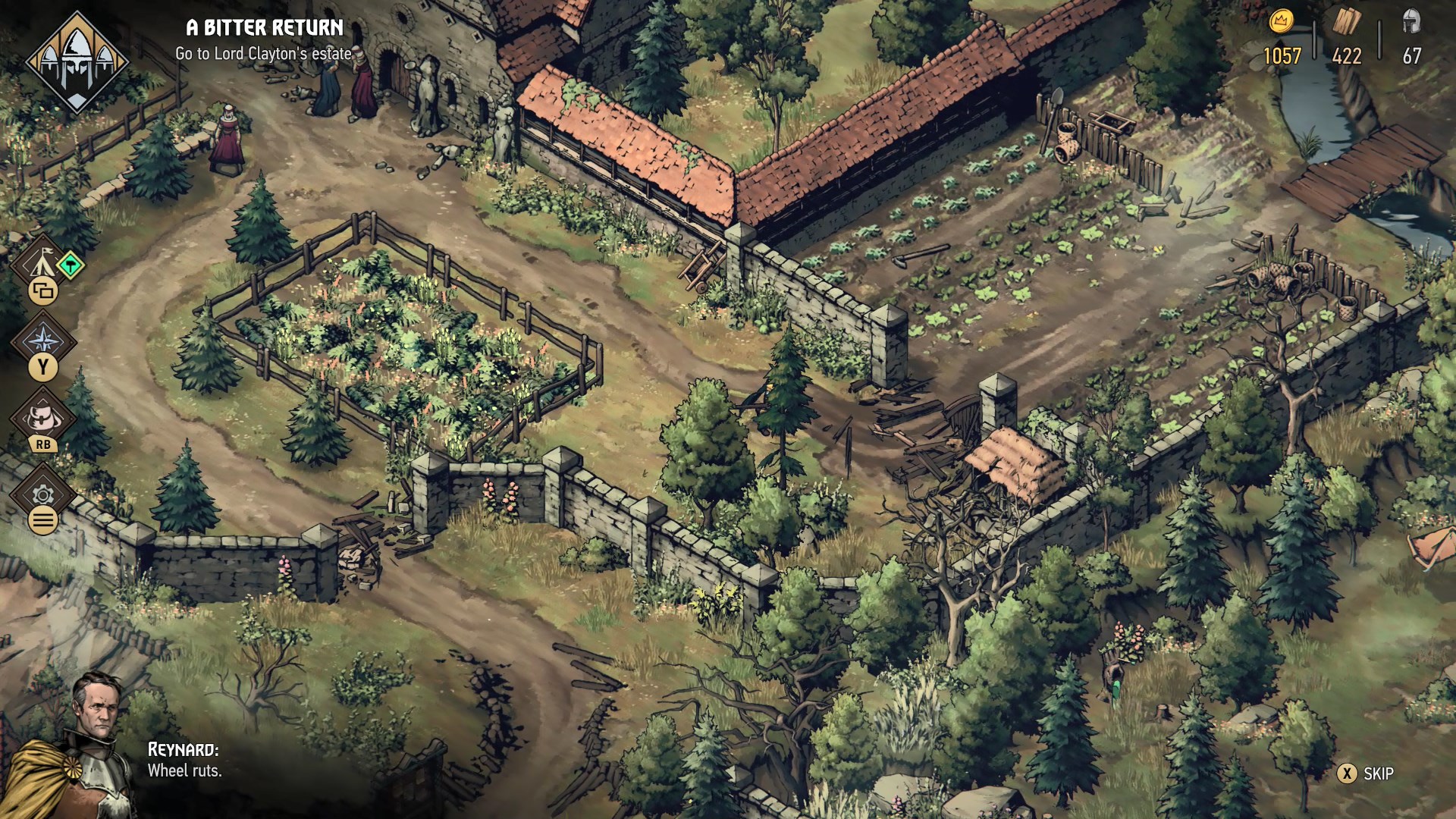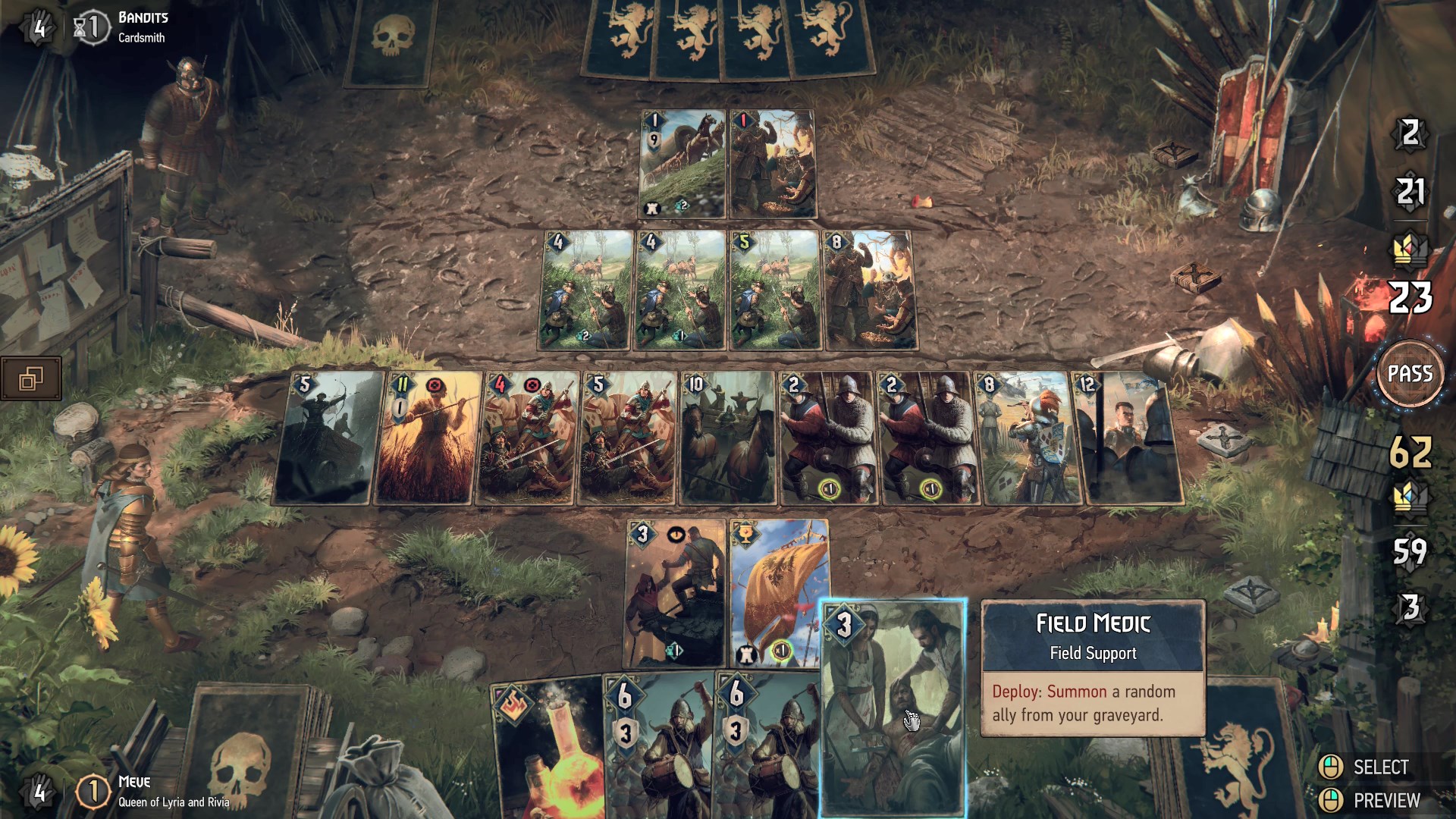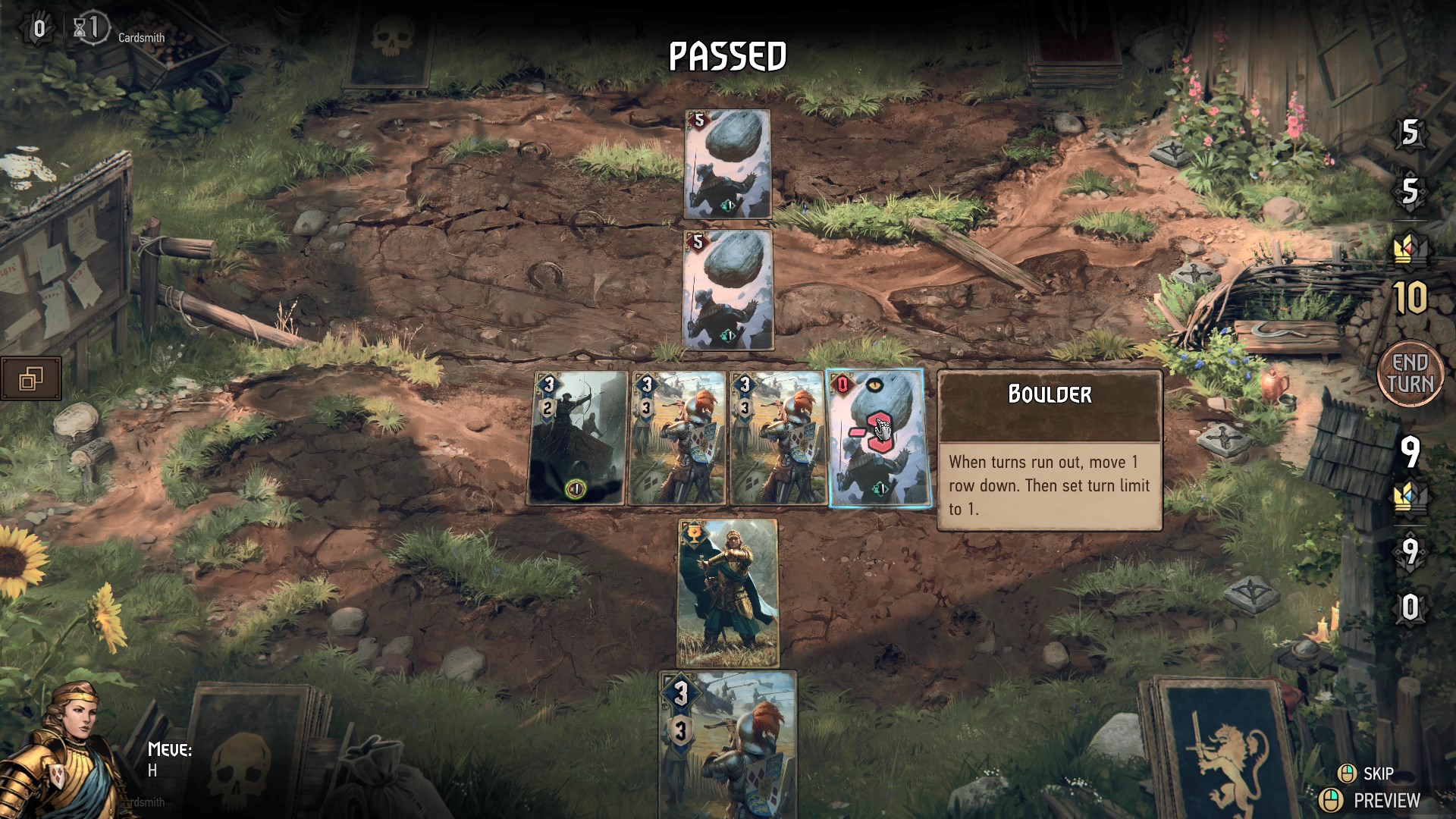Thronebreaker is a true Witcher RPG and a surprisingly sharp card puzzler
Rich in dialogue and decisions and clever card-based puzzles, with a vastly deepened version of Gwent at its center.
I thought I would be a fair and judicious queen. When a peasant reached out to shake my royal hand, I didn't toss him in prison as my most pompous advisor suggested. I laughed it off, and even gave him a pass for harboring a local criminal, understanding that times are always lean in the Northern Realms' kingdoms of Lyria and Rivia. But when I stumbled upon a village where a bloodthirsty crowd was slaughtering every nonhuman they could find, there was no hesitation. I put every racist instigator to the sword. Typical Witcher sidequest. In Geralt's world, something twisted or tragic is always right around the corner.
The voice acting is at least as good as The Witcher 3's. Maybe even better.
Except I'm not Geralt anymore: I'm Meve, queen of Lyria and Rivia, a minor character from The Witcher books that CD Projekt Red has built the campaign of Thronebreaker: The Witcher Tales around. Surprisingly, after spending so much time as Geralt, it doesn't feel jarring to slip into another role in the Witcher's world. Thronebreaker isn't a sprawling 3D RPG--it's mostly a game of dialogue and decision-making peppered with Gwent card combat--but it's still unmistakably a Witcher game. Within moments I was making morally gray choices and catching whiffs of the complex politics swirling around me. It felt good to be back.
Thronebreaker started life as a much smaller singleplayer expansion for Gwent, but has since morphed into a campaign CD Projekt expects to take 20-40 hours to finish. In some ways it feels a bit like an adventure game (or even a visual novel) when you're not in combat. It's heavy on the dialogue and narration, and the voice acting feels decadent as text unfurls on the screen. The accents are strong and varied, and after playing for a couple hours I'd say the voice acting is at least as good as The Witcher 3's. Maybe even better. This game is boldly confident in its presentation from the outset.
The catch, of course, is you're watching largely static 2D art as the characters talk. While the first two hours of an RPG aren't a great litmus test for dramatic impact, I'm skeptical this dialogue will have quite the same effect as The Witcher 3's many cutscenes and detailed facial animations. But from what I've played, it seems like quests will be plentiful and varied in Thronebreaker, asking you to make choices as Queen Meve that will affect how that quest plays out and potentially how your campaign goes, in the end.
Principal writer Jakub Szamałek told me that there are more than 20 different end states based on the decisions you make. I expect there are a lot of small variables inflating that number, but seeing the ramifications of even minor decisions makes Thronebreaker more of an RPG than I was really expecting.
Exploration plays out across five 2D maps or areas, and judging by the first one, at least, they're huge. I walked around only a fraction of it in my two hours with Thronebreaker, and there are little sidequests and points of interest and treasure chests to be found everywhere. Like in a lot of open world games, you can also wander off the road to collect things, in this case some generic resources, either gold or materials, which are used to upgrade your military camp and improve your army.
It's a shame that wandering around for these things and clicking on them is instantly boring. They're all over the place, and all you get for clicking on them is a very videogamey pop-up, like "+25." They seem like they're there because the world would be too empty without more things to click on, but they're not interesting in any way.
Keep up to date with the most important stories and the best deals, as picked by the PC Gamer team.
I spent a while thinking about why I found this rote resource gathering so dull, when it's effectively the same as running over plants in The Witcher 3 and tapping a button to scoop them up, or grabbing bugs as I run past in Monster Hunter World, a game I've been greedily hoarding resources in for the past month. Collecting those items is not really fun, either. But in the context of their environment, those items have purpose. They're decorative, adding color and variety to the world. And they're used in crafting recipes, which applies some light level of narrative to why you're collecting them. Thronebreaker abstracts these environmental interactions to nothing more than a number. It's disappointing busywork.
That was the only thing I didn't like about Thronebreaker. Gwent has changed radically since it first appeared in The Witcher 3, and is now far more complex, with many interactions between cards and active abilities that make it more than a game of straight numbers. I didn't have nearly enough time with the game to say if Gwent will stay fun as the focus of a lengthy campaign, but what I played was really promising because Thronebreaker weaves story into nearly every battle, introducing one-off mechanics and cards to give encounters their own gimmicks.
For instance, in my first real boss battle, a rogue named the Duke of Dogs spent the entire battle on my side of the field, damaging cards on either side of him unless their strength outweighed his. And in his deck he had cards that would create duplicates of the card they were placed beside after a turn had passed--and he kept playing those cards next to the Duke, who had the highest strength on the board. I had to scramble to kill those duplicating cards before their ability triggered, or I'd be quickly overwhelmed.
Battles in Thronebreaker often aren't going to be straightforward, and I think that's the only way to keep a card game campaign interesting over many hours. Accumulating cards and customizing your deck will be fun, and Szamałek said there will be quite a lot of variety there, but I'm relieved that they're using the mechanics of the cards themselves to tell stories even in the first two hours.
Sidequests and monster hunts, in proper Witcher fashion, are even better. Here battles are literally turned into puzzles, giving you a set hand of cards and an obstacle to overcome by playing them and using their abilities in a precise order. It's an idea that's been done in the digital Magic: the Gathering games and Hearthstone, and I can't get enough of it. Here's an early example: I ran into a group of rotfiends, gruesome necrophages who eat flesh and are filled with nasty gas which makes them explode when they die. It's bad when they explode, so the puzzle requires that I drop their health to 1 but don't kill them.
The solution, which it took me a few tries to perfect, was first playing a card that spawned two more units, then playing a couple infantry cards that can switch rows when I activate them, and only then playing some crossbowmen cards that deal damage to an enemy card based on how many cards are in their row. By moving the controllable infantry cards out of the row one at a time, I could keep playing crossbowmen and deal the needed 7 (but not 8!) damage to each rotfiend.
Even in the first two hours I ran into a few sidequest puzzles that stumped me for a few tries. They get complex and hard fast, and are easily the part of Thronebreaker I'm most excited about. I expected to play a card battle RPG, but I didn't think I'd get a puzzle game in the bargain.
The card combat is inventive. The puzzles are even better. Meve's story isn't exactly thrilling right away, but Thronebreaker is heavy on tutorials for the first hour, and it seemed like I was just beginning to see the real story--trouble brewing with Nilfgaard--when I wrapped up my demo. This is a remarkably strange follow-up to the biggest RPG of the decade, and if you hate Gwent you're still probably not going to like Thronebreaker. But I have to admire CD Projekt for looking at what was once a minigame and saying "Yeah, we can turn that into a 40 hour RPG."
Thronebreaker is out October 23.

Wes has been covering games and hardware for more than 10 years, first at tech sites like The Wirecutter and Tested before joining the PC Gamer team in 2014. Wes plays a little bit of everything, but he'll always jump at the chance to cover emulation and Japanese games.
When he's not obsessively optimizing and re-optimizing a tangle of conveyor belts in Satisfactory (it's really becoming a problem), he's probably playing a 20-year-old Final Fantasy or some opaque ASCII roguelike. With a focus on writing and editing features, he seeks out personal stories and in-depth histories from the corners of PC gaming and its niche communities. 50% pizza by volume (deep dish, to be specific).




